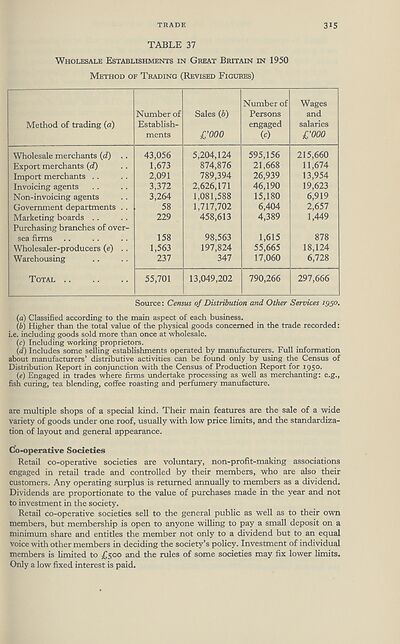Britain: An official handbook > 1956
(345)
Download files
Complete book:
Individual page:
Thumbnail gallery: Grid view | List view

TRADE
315
TABLE 37
Wholesale Establishments in Great Britain in 1950
Method of Trading (Revised Figures)
Method of trading (<3)
Number of
Establish¬
ments
Sales (b)
£’000
Number of
Persons
engaged
(c)
Wages
and
salaries
£’000
Wholesale merchants (d)
Export merchants (d)
Import merchants . .
Invoicing agents
Non-invoicing agents
Government departments
Marketing boards . .
Purchasing branches of over
sea firms
Wholesaler-producers (e) .
Warehousing
Total ..
43,056
1,673
2,091
3,372
3,264
58
229
158
1,563
237
55,701
5,204,124
874,876
789,394
2,626,171
1,081,588
1,717,702
458,613
98,563
197,824
347
595,156
21,668
26,939
46,190
15,180
6,404
4,389
1,615
55,665
17,060
13,049,202
790,266
215,660
11,674
13,954
19,623
6,919
2,657
1,449
878
18,124
6,728
297,666
Source: Census of Distribution and Other Services 1950.
(a) Classified according to the main aspect of each business.
\b) Higher than the total value of the physical goods concerned in the trade recorded:
i.e. including goods sold more than once at wholesale.
(c) Including working proprietors.
(d) Includes some selling establishments operated by manufacturers. Full information
about manufacturers’ distributive activities can be found only by using the Census of
Distribution Report in conjunction with the Census of Production Report for 1950.
(e) Engaged in trades where firms undertake processing as well as merchanting: e.g.,
fish curing, tea blending, coffee roasting and perfumery manufacture.
are multiple shops of a special kind. Their main features are the sale of a wide
variety of goods under one roof, usually with low price limits, and the standardiza¬
tion of layout and general appearance.
Co-operative Societies
Retail co-operative societies are voluntary, non-profit-making associations
engaged in retail trade and controlled by their members, who are also their
customers. Any operating surplus is returned annually to members as a dividend.
Dividends are proportionate to the value of purchases made in the year and not
to investment in the society.
Retail co-operative societies sell to the general public as well as to their own
members, but membership is open to anyone willing to pay a small deposit on a
minimum share and entitles the member not only to a dividend but to an equal
voice with other members in deciding the society’s policy. Investment of individual
members is limited to £500 and the rules of some societies may fix lower limits.
Only a low fixed interest is paid.
315
TABLE 37
Wholesale Establishments in Great Britain in 1950
Method of Trading (Revised Figures)
Method of trading (<3)
Number of
Establish¬
ments
Sales (b)
£’000
Number of
Persons
engaged
(c)
Wages
and
salaries
£’000
Wholesale merchants (d)
Export merchants (d)
Import merchants . .
Invoicing agents
Non-invoicing agents
Government departments
Marketing boards . .
Purchasing branches of over
sea firms
Wholesaler-producers (e) .
Warehousing
Total ..
43,056
1,673
2,091
3,372
3,264
58
229
158
1,563
237
55,701
5,204,124
874,876
789,394
2,626,171
1,081,588
1,717,702
458,613
98,563
197,824
347
595,156
21,668
26,939
46,190
15,180
6,404
4,389
1,615
55,665
17,060
13,049,202
790,266
215,660
11,674
13,954
19,623
6,919
2,657
1,449
878
18,124
6,728
297,666
Source: Census of Distribution and Other Services 1950.
(a) Classified according to the main aspect of each business.
\b) Higher than the total value of the physical goods concerned in the trade recorded:
i.e. including goods sold more than once at wholesale.
(c) Including working proprietors.
(d) Includes some selling establishments operated by manufacturers. Full information
about manufacturers’ distributive activities can be found only by using the Census of
Distribution Report in conjunction with the Census of Production Report for 1950.
(e) Engaged in trades where firms undertake processing as well as merchanting: e.g.,
fish curing, tea blending, coffee roasting and perfumery manufacture.
are multiple shops of a special kind. Their main features are the sale of a wide
variety of goods under one roof, usually with low price limits, and the standardiza¬
tion of layout and general appearance.
Co-operative Societies
Retail co-operative societies are voluntary, non-profit-making associations
engaged in retail trade and controlled by their members, who are also their
customers. Any operating surplus is returned annually to members as a dividend.
Dividends are proportionate to the value of purchases made in the year and not
to investment in the society.
Retail co-operative societies sell to the general public as well as to their own
members, but membership is open to anyone willing to pay a small deposit on a
minimum share and entitles the member not only to a dividend but to an equal
voice with other members in deciding the society’s policy. Investment of individual
members is limited to £500 and the rules of some societies may fix lower limits.
Only a low fixed interest is paid.
Set display mode to:
![]() Universal Viewer |
Universal Viewer | ![]() Mirador |
Large image | Transcription
Mirador |
Large image | Transcription
The item on this page appears courtesy of Office for National Statistics and may be re-used under the Open Government Licence for Public Sector Information.
| Britain and UK handbooks > Britain: An official handbook > 1956 > (345) |
|---|
| Permanent URL | https://digital.nls.uk/205500752 |
|---|
| Attribution and copyright: |
|
|---|---|
| Description | 'Britain: An official handbook' was produced annually by the Central Office of Information from 1954-1998. There are 44 volumes available here to view. |
|---|---|
| Shelfmark | GII.11 |
| Description | Three titles produced by the British Government from 1954-2005 describing 'how Britain worked'. They are: 'Britain: An official handbook' (1954-1998), 'Britain: The official yearbook of the United Kingdom' (1999-2001), and 'UK: The official yearbook of the United Kingdom of Great Britain and Northern Ireland' (2002-2005). These 50 reports provide an overview of Britain's economic, social and cultural affairs, its environment, international relations, and the systems of government. They give an impartial summary of government policies and initiatives, and explain how public services are organised. |
|---|---|
| Additional NLS resources: |
|

